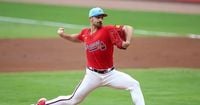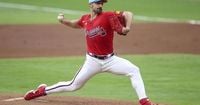On a warm Independence Day evening at Truist Park, the Atlanta Braves and Baltimore Orioles kicked off a much-anticipated three-game interleague series. Both teams, struggling to find consistent form this season, looked to seize momentum as they clashed in Atlanta on July 4, 2025. The matchup featured a compelling pitching duel between Braves' right-hander Spencer Strider and Orioles' veteran Charlie Morton, setting the stage for a classic showdown.
Coming into the game, the Braves held a 39-47 record, marginally better than the Orioles’ 37-49. Despite their sub-.500 marks, both teams carried distinct narratives. The Orioles were reeling from consecutive heavy losses to the Texas Rangers, surrendering a combined 16 runs over two games and allowing six or more runs in three straight outings. Their pitching staff had been especially vulnerable, struggling to contain opposing offenses and conceding runs at an alarming rate.
Conversely, the Braves had also stumbled recently, dropping or splitting their last four series after a sweep of the Mets in mid-June. Their recent 2-6 stretch over eight games underscored ongoing challenges, but a silver lining appeared in the form of first baseman Matt Olson. Olson was on a tear, hitting safely in 10 consecutive games and delivering a grand slam just days prior against the Los Angeles Angels. His batting average had climbed impressively from .250 to .267 since late June, offering hope to a Braves lineup eager to ignite.
The pitching matchup was a tale of contrasts. Charlie Morton, now with Baltimore, had struggled through the season, posting a 4-7 record with a 5.63 ERA. His road numbers were particularly concerning, sporting a 6.21 ERA and a 1.75 WHIP over 26⅓ innings. Morton’s command issues and tendency to allow hard contact made him vulnerable, especially against a Braves team familiar with his style. In his last start on June 24, Morton pitched five innings, allowing three earned runs in a narrow loss to the Rangers.
On the mound for Atlanta, Spencer Strider was showing signs of resurgence. Despite a 3-6 record, his 3.86 ERA masked a recent stretch of dominant outings. Over his last four starts, Strider had lowered his ERA to 2.87, with an increasing strikeout rate culminating in 11 Ks in his most recent outing. At home, his performance was even more impressive, boasting a 2.94 ERA and holding opponents to a .215 batting average. Strider’s fastball velocity remained a weapon, touching 98 mph and averaging 96.1 mph during the game, while issuing just one walk over six strong innings.
The game itself was a tightly contested affair. Strider’s steady pitching kept the Orioles’ bats largely in check, limiting them to just two runs over six innings. Meanwhile, the Braves’ offense, paced by catcher Drake Baldwin’s 10th home run of the season, tried to capitalize on any mistakes. Baldwin’s power surge, combined with the absence of Sean Murphy due to rest, highlighted Atlanta's depth in the lineup. Murphy and Baldwin had combined for five home runs over the prior nine games, underscoring the Braves’ offensive potential despite recent struggles.
Former Brave Charlie Morton delivered a solid performance for Baltimore, pitching 5.1 innings and striking out seven batters. His ability to keep Atlanta’s hitters at bay for much of the game was a key factor in the Orioles’ narrow 3-2 victory in the series opener. Despite the loss, Strider’s outing reinforced his status as a frontline starter for the Braves, demonstrating improved command and strikeout ability.
The Braves faced additional challenges with Spencer Schwellenbach placed on the injured list due to a fractured right elbow, announced just days before the game. The team had yet to name his replacement for the following day’s start, adding uncertainty to their pitching depth. The series was set to conclude on Sunday, with the Braves planning to travel to Sacramento and St. Louis for games against the Athletics and Cardinals before the All-Star break.
Looking at the broader context, Truist Park’s pitcher-friendly reputation (ranking 17th in run factor and home run factor) suggested that scoring might be limited. However, warm and humid July conditions typically mitigate these effects, potentially aiding well-struck balls. The forecasted 84°F temperature and 65% humidity for the game likely helped the Braves' hitters, especially power threats like Olson, who thrived against pitchers like Morton who tend to leave pitches elevated.
Betting markets had favored the Braves as slight favorites, with moneyline odds around -179 and a run line of -1.5 at +135. Sharp money had moved toward Atlanta despite their recent struggles, reflecting confidence in Strider’s pitching and the team’s home advantage. The over/under was set at 8.5 runs, with some bettors leaning toward the over, anticipating offensive contributions from both sides given Baltimore’s bullpen vulnerabilities and Atlanta’s improving offense.
The Orioles’ bullpen had been a significant weakness this season, posting a collective 4.82 ERA, ranking 23rd in MLB. Injuries, including the recent placement of Keegan Akin on the 15-day injured list, further depleted their relief corps. Although closer Felix Bautista remained dominant with 16 saves, getting to him had been a challenge for many teams. Atlanta’s bullpen, by contrast, showed more consistency with a 3.94 ERA, ranked 12th in the league, and effective closing from Raisel Iglesias who had converted 9 of 11 save opportunities.
Offensively, the Orioles averaged 4.15 runs per game but had struggled on the road, going 18-27 away from Camden Yards. The Braves’ home record was notably better at 24-19 compared to their 15-28 road performance. Both teams had identical 4-6 records in their last 10 games, but the Braves’ stronger pitching and home advantage gave them a clear edge in the series.
Matt Olson’s resurgence was a focal point for Atlanta’s hopes. With 38 extra-base hits on the season, including 22 doubles and 16 home runs, Olson had become a consistent offensive threat. His ability to reach base safely in 33 consecutive games and his success against right-handed pitchers with elevated ERAs made him a key player to watch. Against Morton, who allowed a high home run rate, Olson’s power could be decisive.
As the series progressed, fans eagerly anticipated whether the Braves could capitalize on their advantages and improve their standing before the All-Star break. With the pitching duel setting the tone, every inning promised intensity and strategic battles, reflecting the high stakes for two teams striving to turn their seasons around.
Friday’s opener underscored the competitive nature of interleague play, with the Orioles eking out a close win despite their struggles and the Braves showing signs of life through standout individual performances. The series remained wide open, with both teams looking to gain the upper hand in the games to come.


